Volleyball in a hijab: Does this picture show a culture clash?
- Published
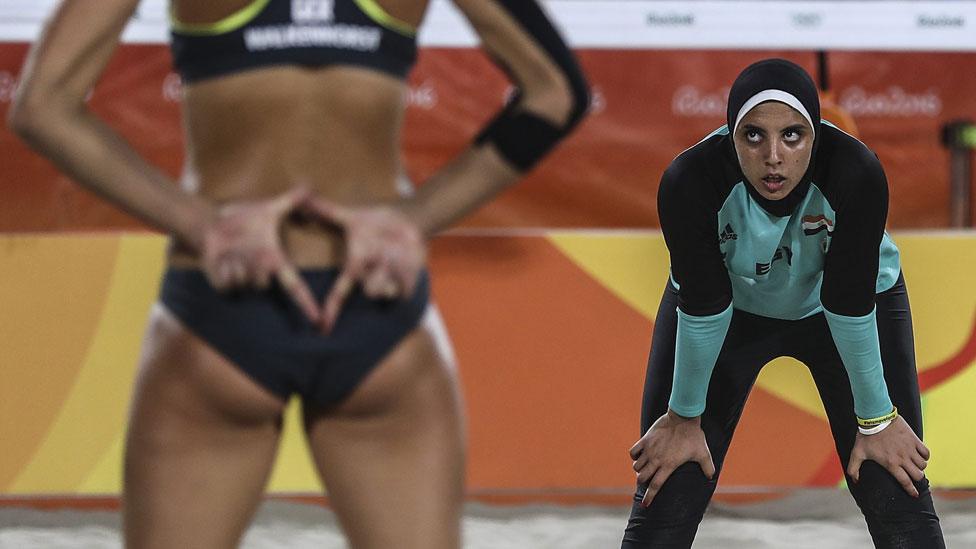
For the Times it was a "culture clash", for the Daily Mail "a massive cultural divide" between "the cover-ups" and "the cover-nots" - and for the Sun the cultural divide was not "massive" but "colossal".
The pictures of Egypt's women's beach volleyball team playing Germany swept the internet yesterday, but while some people focused on what divided the players, others focused on what united them.
"Hijab vs bikini thing aside, how much of a 'culture clash' is it really if you are both playing women's beach volleyball at the Olympics?" tweeted columnist Ben Machell, external.
CNN's Bill Weir described it on Twitter as an Olympic Rorschach test, external, asking: "Do you see a culture clash? Or the unifying power of sport?"
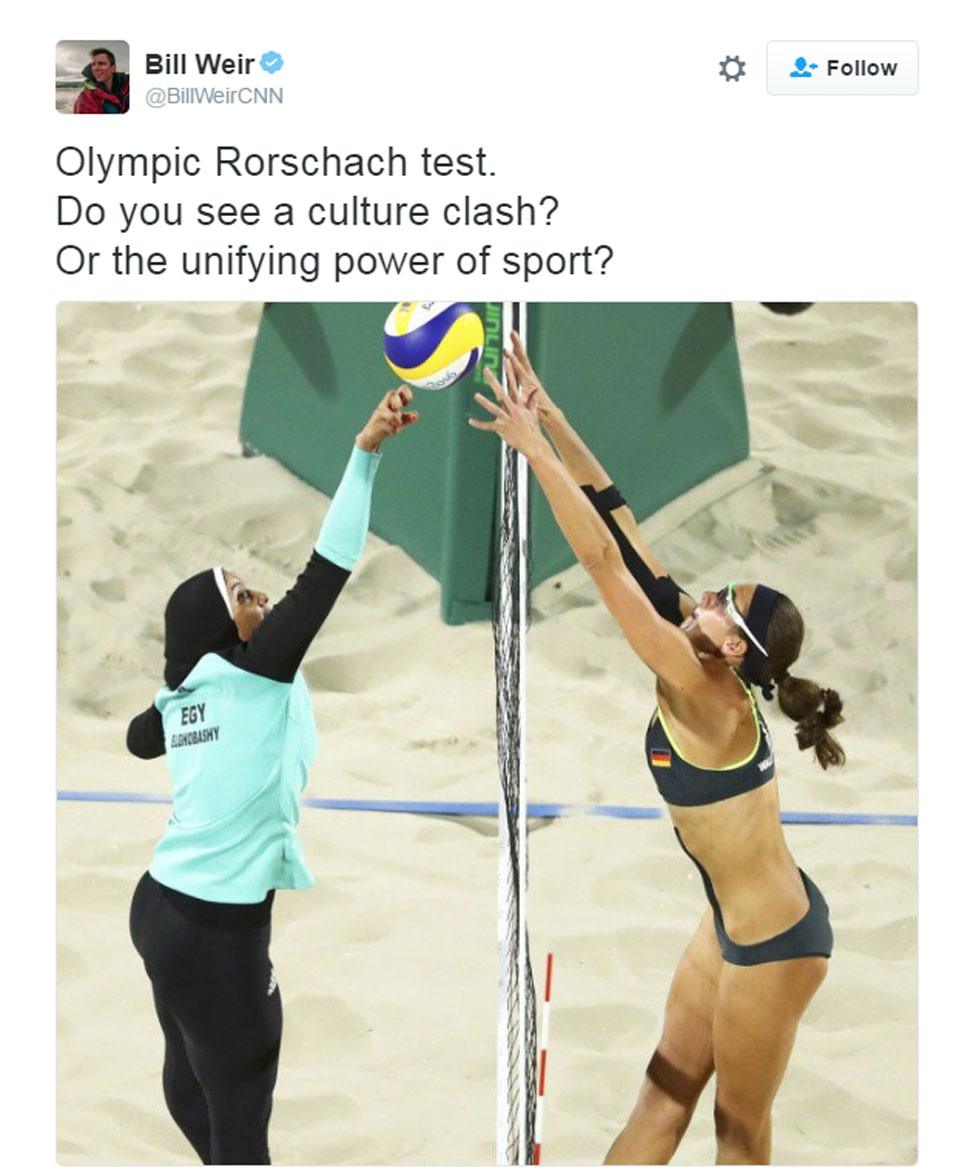
A "culture clash" is defined in the Oxford dictionaries as "conflict or discord resulting from the interaction of (two) different cultures".
There was none of this on display on the Copacabana beach, though the reaction on social media might be described as "culture shock" - "the feeling of disorientation experienced by someone when they are suddenly subjected to an unfamiliar culture, way of life, or set of attitudes".
Up until the 2012 Olympics female volleyball players were obliged to wear bikinis (with the lower part no more than 7cm from top to bottom at the hip, external) or a one-piece swimming costume - a rule which some regarded as a transparent attempt to make the sport sexy.
The Australian Sports Commission complained that the International Volleyball Federation (FIVB), the sport's governing body, had "introduced uniforms intentionally to focus attention on the athletes' bodies rather than for any technological, practical or performance-enhancing reasons".
But since 2012 the rules have allowed women to wear shorts, long-sleeve shirts and body suits. British weather drove the Brazilian team, among others, to take up the full body-cover option.
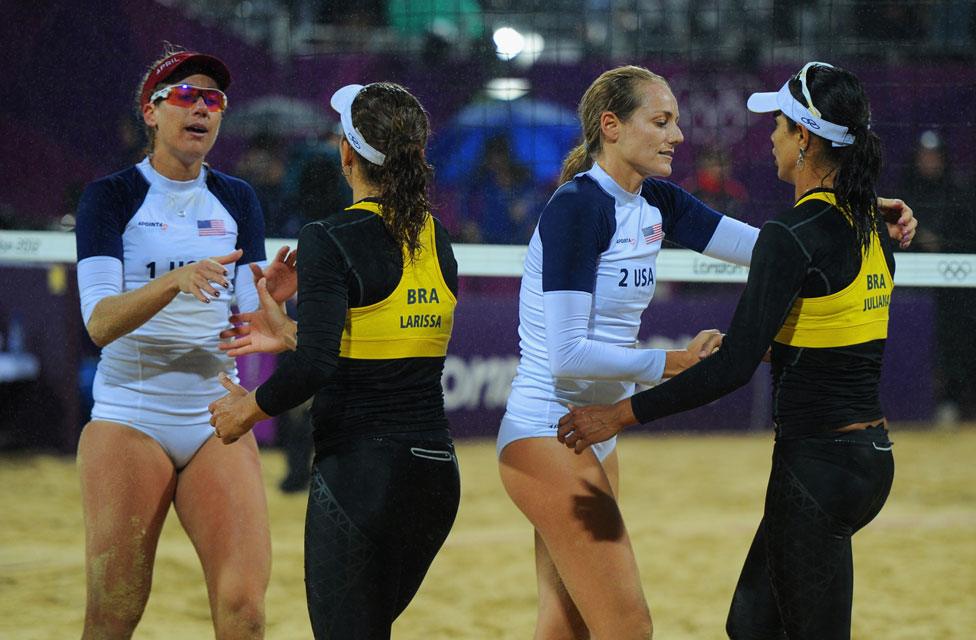
2012: April Ross and Jennifer Kessy of the US shake hands with Larissa Franca and Juliana Silva of Brazil
Egypt's Doaa Elghobashy, however, is the first Olympian beach volleyball player to wear a hijab as well though, thanks to a last-minute concession from the FIVB just in time for the Rio Olympics.
"I have worn the hijab for 10 years," Elghobashy said. "It doesn't keep me away from the things I love to do, and beach volleyball is one of them."
Her partner, Nada Meawad, chose to play bare-headed.
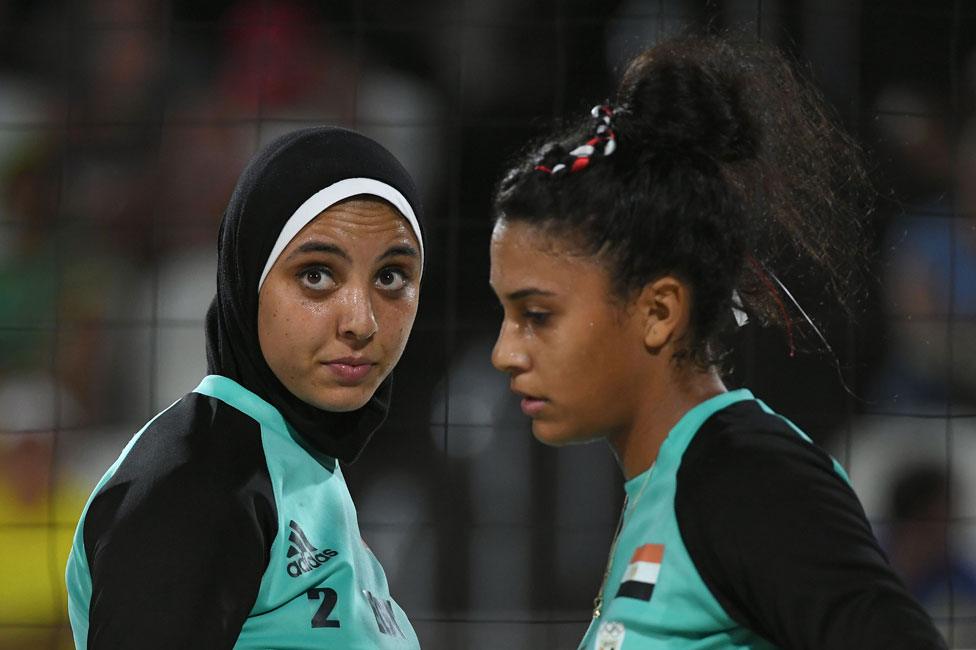
Doaa Elghobashy and Nada Meawad

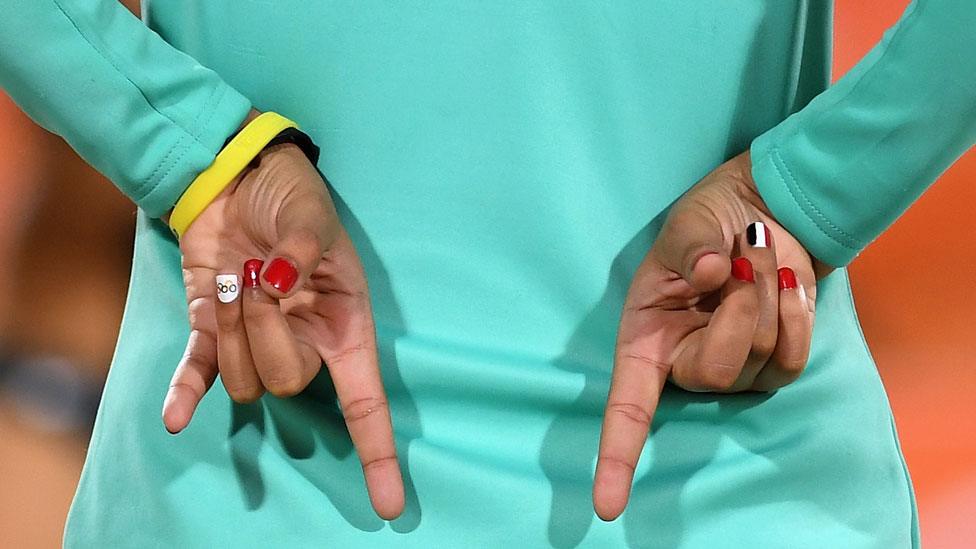
As well as wearing a hijab, Elghobashy had a patriotic manicure
Two tweets, among others, stirred a furious debate.
Andrew Stroehlein of Human Rights Watch tweeted the picture, external with the caption "What's wrong with this picture? (Hint: nothing)". Plenty of people replied to say they disagreed.
Ian Bremmer of the Eurasia Foundation, meanwhile, asked which of the athletes were dressing closer to how they would actually prefer to dress, adding "Not obvious", external.
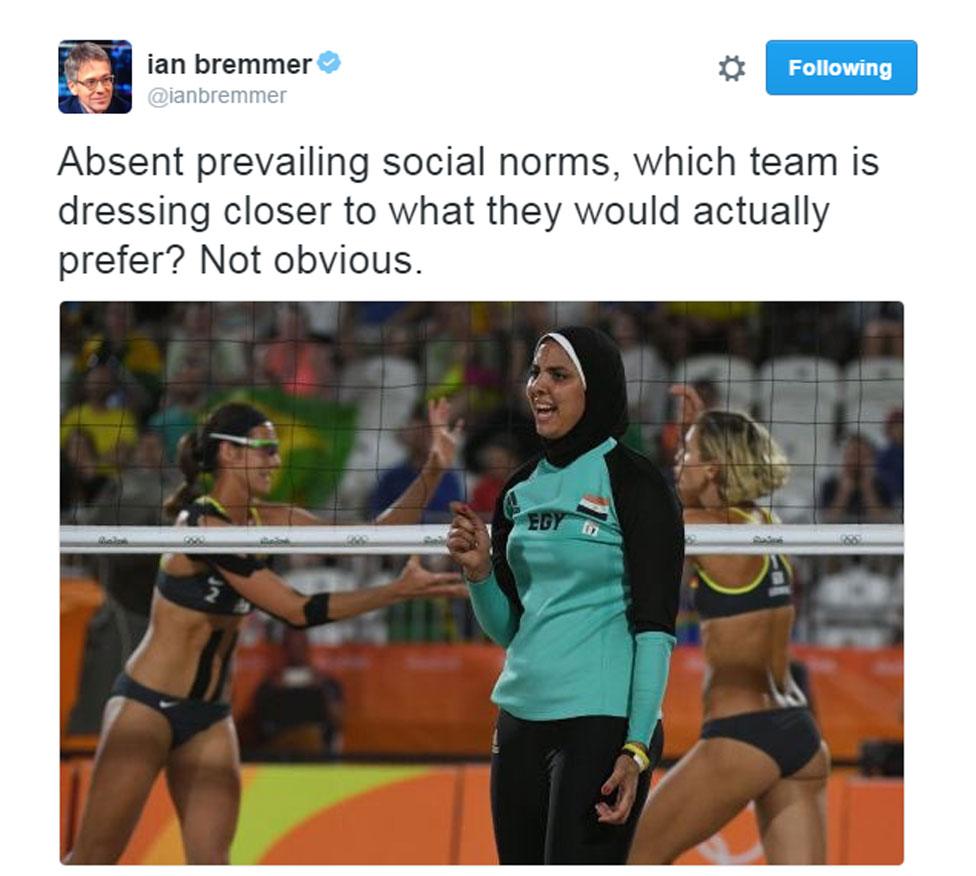
Some of those who replied to the post had a problem with women wearing the hijab at all - others had a problem with the idea of a sport where the woman's body is part of the spectacle.
The men's volleyball outfit, by the way, falls somewhere in between the bodysuit and the bikini - it's a singlet with shorts.
And often the players cover their heads.

Follow @BBCNewsMagazine, external on Twitter and on Facebook, external
A selection of your comments:
I think it shows how much a female athlete's body is understood as a public possession. Either it must be seen, or it must not be seen, but either way, their sporting committees, countries and cultures get to decide rather than the individuals. Lissa Pelzer, Stuttgart, Germany
This is definitely a cultural clash, not "Olympic ideals in action". It is beach volleyball. Women wear swimsuits on the beach: It is only natural that a team's uniform is made up of a swimsuit. If it was the IOC that was choosing the uniforms, then yes, I would say you are looking at "Olympic ideals in action". As for the men's uniform, it is not uncommon to see male beach volleyball players wearing only a swimsuit. The fact that trunks are a lot more covering than a bikini is a product of social norms (girls wear this, guys wear that). Greg Judkowski, Pennsylvania, US
I have always thought that the required bikini outfit for women in beach volleyball looks ridiculous when compared to what the men wear. Why aren't the men wearing speedos? It's sexist. Why can't the women wear tanks and short shorts? As for the Muslim players having to be all covered up and wearing hijabs, I just feel sorry for them. They must be so hot and couldn't that cause heat stroke? Carolyn Moore, USA
We have one group of women covered from head to toe and another group who are almost naked, wearing less than men do playing the same sport. Until women stop being, and being seen as, sex objects there will never be equality. Freda Jones, Brighton
Why is this a culture clash? Both women have chosen to wear what they want to wear, in line with FIVB standards. Surely in this day and age we should just be enjoying the sport and not focusing on the fashion. I don't see why anyone should be offended by any of this. Samantha Galbraith, Hamilton
The picture shows the great leveller that sport is. Whatever your race, colour, creed, religion, all athletes are playing on the level ground that is sport. It's as simple as that. Those who choose to highlight the perceived differences based on what a sports person chooses to wear, show only their own ignorance to the diverse world we live in today. It's about time we started looking at the world inclusively, rather than seeking to find and exploit differences and create divide. Fiona Harris, Castle Douglas
What is not to love about women being involved in a sport they love and choosing to wear the best sportswear to allow them to get the best out of themselves? The more often that women challenge nonsensical rules set out by men for their own titillation, whether for religious or practical reasons, the better. Michelle, Long Eaton
I think the right question to ask is whether both girls would be able to decide what to wear. The Brazilians could take the full cover option in London: Can the Egyptians take the bikini option? Gianluca de Lorenzo, Heidelberg, Germany
There is no reason for offence on either side. One could argue that "traditional" beach wear is vulgar and sexualises the sport, therefore covering up is in good taste and allows for focus on the match and not on people's bodies. Conservative dressing shows respect for all, not mass oppression. Naqib, Gillingham
To me it shows that regardless of different ways we go about our lives we can come together and enjoy sport and friendship. Pete, Oxford
Not a culture clash at all but more a reminder of what a beautiful and diverse world we live in. Totally shocked to find out women had to wear bikinis up until 2012. Volleyball does appear to still be about the women's body and not yet the way that it's an exciting and challenging sport. Adelaide, Bedfordshire
It is not a cultural clash. It is just a cultural difference. Sureyya, Azerbaijan